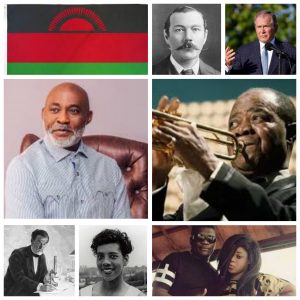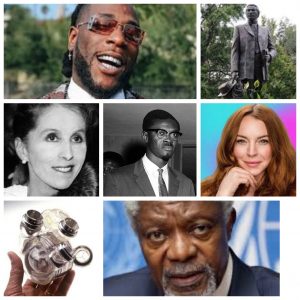
1913: The first Indian full-length feature film is premiered. The release of Raja Harishchandra marked the birth of the Indian film industry, the world’s largest in terms of films produced and ticket sales.

1926; Britain’s Trade Union Congress calls for the country’s first-ever general strike, which begins at 1 minute to midnight in support of striking coal miners, and lasts 9 days.
1947: Japan’s post-war constitution goes into effect, granting universal suffrage, stripping Emperor Hirohito of all but symbolic power, and outlawing Japan’s right to make war.
1958: Truman Capote’s book Breakfast at Tiffany’s is published. The novella is one of the U.S. author’s most popular works. The 1961 film of the same name starring Audrey Hepburn is a classic in its genre.
1978: The Digital Equipment Corporation sends the world’s first spam email
A representative sent out 600 emails and sold computers for $12 million. Unsolicited bulk emails have since become a scourge of the digital age as spammers attempt to achieve similar success.
1979: Margaret Thatcher is elected British Prime Minister. The conservative politician was the first female head of state in Europe. During her 11-year reign, her sweeping economic reforms polarized the British public and her toughness earned her the nickname The Iron Lady. She later became the longest-continuously serving British premier since 1827.

1898: The weather is a challenge to Southern Africa’s unpaved urban streets. The winds of the early southern hemisphere winter turn Market Street in Johannesburg, South Africa into a dust storm blinding the African rickshaw pullers and their white passengers, frightening the horses, and making the city centre look like the Kalahari Desert.
1911: Portuguese colonial authorities issue Game Regulations for Manica and Sofia provinces in Portuguese Mozambique. The regulations allow “Kaffir arms (assegais, harpoons, etc.” to be used, and set the hunting season from 1 November to 30 April. This is not a strict conservation act. These animals are allowed to be shot in and out of season without a license: “Lion, leopard, lynx, panther, hyena, jackal, wild-boar, wolf, crocodile, cobra, wild cats, porcupine, baboons, monkeys and in general the whole cat tribe.”
1927: Africa’s first trade fair, the Tripoli International Fair, is created by the Italian government as an annual showcase to be held in Italian Libya. Until its suspension during World War II, the trade fair was a major international event, drawing dozens of countries and thousands of exhibitors.
1964: The radio station The Middle East Network begins broadcasting, from Cairo, Egypt, transmitting 24 hours a day.
1988: Peace talks aimed at ending the South Africa-Angola Border War begin, sponsored by Cold War superpower rivals the U.S. and the Soviet Union, which have provided aid to both sides but are now weary of the conflict.
1989: On his latest papal tour of Africa, Pope John Paul II arrives in Zambia, to be greeted by hundreds of thousands of Catholics. His flight is the only time a Concord supersonic jet lands in Zambia.
1994: Now a democratic state, South Africa resumes full membership in the U.N.’s World Health Organisation. Tomorrow (May 4) the United Nations Educational Scientific and Cultural Organisation (UNESCO) will invite South Africa to rejoin that organization.
2018: After Uganda’s ipso facto President for Life Yoweri Museveni slams Ugandan doctors, who are on strike at government hospitals because of low pay, saying “I am working for low pay.” He uses a phrase from U.S. President Donald Trump and calls the doctors “enemies of the people.” Social media erupts with posts about Museveni’s considerable wealth. Kampala’s The Observer newspaper reports that Uganda’s 2016/17 government budget paid Museveni and his family US$63 million. An entry-level doctor in public healthcare earns US$300 a month.
BIRTHS ON THIS DAY: May 3
Mo Ibrahim, 78 years
Sudanese businessman and good governance activist, in British Sudan. Using the fortune he acquired through his businesses, he created the Mo Ibrahim Foundation in 2006. Since 2007, the foundation has been awarded the Mo Ibrahim Prize for Achievement in African Leadership. The Ibrahim Index of African Governance is a respected annual assessment and ranking of how all of Africa’s 54 country governments are achieving or falling short of good governance.

Genevieve Nnaji, 45 years
Nigerian actress and director, in Mbaise, Nigeria. For her contributions to Nollywood, she was inducted by the Nigerian government in 2011 as a Member of the Order of the Federal Republic. In 2018, her first film as a director, Lionheart, was the first Netflix production made in Nigeria and became Nigeria’s first submission to the Academy Awards (Oscars).

Golda Meir (3 May 1898 – 8 December 1978)
Golda Meir an Israeli educator, politician, and 4th Prime Minister of Israel was born on 3 May 1898. Served as the fourth prime minister of Israel from 1969 to 1974. She was Israel’s first and only female head of government and the first in the Middle East.
She died in Jerusalem at the age of 80.

James Brown (May 3, 1933 – December 25, 2006)
Brown was born in South Carolina and raised in Georgia on May 3, 1933, where he began his musical career as a gospel singer in the 1940s was an American musician and songwriter who was one of the most influential figures in 20th century popular music. He is often referred to as the “Godfather of Soul,” and his music had a profound impact on the development of funk, soul, and hip hop. He died of pneumonia at the age of 73.

Sugar Ray Robinson (3 May 1921 – 12 April 1989)
Walker Smith Jr., better known as Sugar Ray Robinson, was an American professional boxer who competed from 1940 to 1965. He was inducted into the International Boxing Hall of Fame in 1990. He is often regarded as the greatest boxer of all time, pound-for-pound. He died at 67.
Kindly like, comment, follow, and share.






















